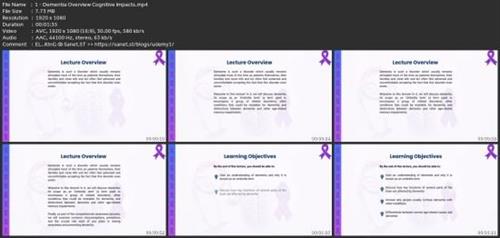
Published 9/2024
MP4 | Video: h264, 1920x1080 | Audio: AAC, 44.1 KHz
Language: English | Size: 1.97 GB | Duration: 4h 19m
Dementia Awareness Training: Master Caregiver Strategies for Every Stage of Dementia and Enhance Quality of Life
What you'll learn
Develop a deep understanding of Dementia Awareness, including the types, stages, and how dementia affects brain functions.
Identify common and rare types of dementia, such as Alzheimer's, Vascular Dementia, and Frontotemporal Dementia.
Master effective communication strategies for interacting with individuals with dementia, using both verbal and non-verbal methods.
Learn about person-centred care and how to create tailored care plans that focus on individual needs.
Understand the role of equality, diversity, and inclusion (EDI) in Dementia Awareness and care practices.
Recognize dementia-related behaviors and apply strategies, including the Four 'R's approach, to support individuals with dementia.
Explore the importance of social interaction and physical exercise in dementia care to improve well-being.
Gain insight into mental health first aid for older adults, including how to address mental health issues and support suicidal cases.
Requirements
No prior knowledge of Dementia Awareness or experience in dementia care is required.
A desire to learn about dementia and how to effectively support individuals affected by the condition.
A basic understanding of caregiving or healthcare may be helpful, but it is not necessary.
A compassionate and patient mindset, especially when learning about dementia and mental health issues.
Description
Dementia Awareness is a rapidly growing field that demands specialized knowledge, empathy, and practical skills to effectively support individuals affected by dementia. The Dementia Awareness Training Course provides a comprehensive guide to understanding dementia and its associated caregiving challenges, helping caregivers develop the essential insights and skills needed to make a positive impact in the lives of those living with dementia.The global demand for professionals trained in Dementia Awareness has risen sharply due to the aging population. According to the World Health Organization (WHO), around 55 million people are currently living with dementia, with 10 million new cases emerging annually. Alzheimer's Disease International (ADI) predicts that this number will triple by 2050, highlighting an urgent need for qualified professionals in Dementia Awareness.In countries like the United States, the Bureau of Labor Statistics reports that home health aide jobs, key roles in Dementia Awareness, are expected to grow by 34% from 2019 to 2029, far exceeding the growth rate of other professions. Similarly, regions like the UK, Canada, and Australia are experiencing a surge in demand for Dementia Awareness professionals as eldercare becomes a greater priority.Career pathways in Dementia Awareness are expanding across the healthcare, social care, residential care, and personal care sectors. The Dementia Awareness Training Course provides the credentials needed to enter these rapidly growing markets and meet the increasing demand for knowledgeable, compassionate dementia caregivers.The Dementia Awareness Training Course offers an engaging and in-depth learning experience for individuals looking to specialize in Dementia Awareness. This course equips you with critical knowledge about dementia and its far-reaching impact on individuals, families, and communities. Going beyond the basics, it delves into the core concepts of Dementia Awareness, enabling you to become a confident and well-rounded caregiver.From understanding the brain functions affected by dementia to recognizing conditions often mistaken for dementia, this course provides a complete educational foundation in Dementia Awareness. You'll explore common dementia types such as Alzheimer's Disease, Vascular Dementia, Lewy Body Dementia, and Frontotemporal Dementia (FTD), gaining insights into how each affects caregiving approaches.Additionally, the course covers rare types of dementia, such as Huntington's Disease, Corticobasal Syndrome (CBS), and CADASIL, to give you a thorough understanding of Dementia Awareness and its associated conditions. You'll also learn about the connection between learning disabilities and dementia, broadening your understanding of all conditions related to Dementia Awareness.Throughout the Dementia Awareness Training Course, you'll explore the progression of dementia from its early stages to advanced phases. Each phase requires specific caregiving approaches, and this course provides clear guidance on how to adapt your care as the disease evolves, reinforcing your knowledge in Dementia Awareness.A key feature of this course is its focus on person-centred care plans. You'll learn how to develop and implement care strategies that prioritize an individual's dignity, needs, and preferences. With real-world examples of person-centred care in Dementia Awareness, you will be equipped to apply these principles in practical caregiving scenarios.Effective communication is vital in dementia care, and the course emphasizes both verbal and non-verbal strategies to enhance your interactions with individuals affected by dementia. By mastering these communication skills, you'll improve the quality of life for those in your care, aligning with best practices in Dementia Awareness.In addition to communication techniques, the course promotes understanding and respect through equality, diversity, and inclusion (EDI) in dementia care. This module ensures you are equipped to deliver inclusive care that acknowledges the unique backgrounds and experiences of individuals with dementia, further enhancing your expertise in Dementia Awareness.The course also integrates the latest research on how social interaction and exercise contribute to better dementia care outcomes. You'll learn how these elements, combined with Dementia Awareness of behaviors and the four 'R's of dementia care-Reassurance, Routine, Redirection, and Respect-can help manage challenging situations more effectively.By completing the Dementia Awareness Training Course, you will not only enhance your caregiving skills but also make a meaningful impact in your workplace, community, and personal life. This course offers a hands-on, practical approach to Dementia Awareness, supported by quizzes, interactive modules, and downloadable materials to reinforce learning.Why You Should Take This Course:Gain specialized knowledge: Deepen your understanding of Dementia Awareness, dementia-related behaviors, and caregiving techniques that improve quality of life.Enhance your career prospects: Certification in Dementia Awareness opens up job opportunities across healthcare, home care, and social care sectors.Learn at your own pace: The course is fully online, allowing you to complete your Dementia Awareness training whenever it's convenient.Person-centred care approach: Master the art of delivering care that respects and responds to individual needs.Practical and interactive: Develop real-world skills through interactive modules and quizzes designed to reinforce Dementia Awareness concepts.Make a difference: Positively impact the lives of individuals living with dementia and their families through compassionate, skilled care based on Dementia Awareness principles.Career Pathways:Upon completion of the Dementia Awareness Training Course, you'll be prepared to pursue various career paths, including:Dementia Awareness Specialist: Work in hospitals, care homes, or private settings to provide specialized dementia care.Home Health Aide: Provide at-home assistance for individuals with dementia, ensuring their safety and well-being through enhanced Dementia Awareness.Senior Care Coordinator: Manage care plans and services for elderly individuals with dementia in residential care facilities, applying your Dementia Awareness expertise.Social Worker for Dementia: Support families and individuals affected by dementia through community services, drawing on your Dementia Awareness training.Caregiver Trainer: Educate and train other caregivers in the best practices of Dementia Awareness and dementia care.Enrolling in the Dementia Awareness Training Course is simple and rewarding. The fully online format means you can start whenever you're ready, and the course offers a wide range of resources including video lectures, quizzes, and downloadable materials. CPD accreditation ensures your certification is recognized by employers and institutions, giving you the credibility you need to advance in your career.By taking this course, you are investing in your future as a compassionate and skilled caregiver, ready to meet the growing demand for Dementia Awareness. Sign up today and take the first step toward becoming a certified expert in Dementia Awareness.Enroll today to earn your certification and become a recognized expert in Dementia Awareness!Please Note: Care Skills Training is an Accredited CPD Member and a proud partner of The Royal Society for the Prevention of Accidents (RoSPA). Upon completing this course, you'll be eligible to receive a CPDQC-accredited certificate for a small additional fee. This prestigious certification will not only strengthen your resume but also enhance your prospects for career advancement and job opportunities.
Overview
Section 1: Dementia Overview & Cognitive Impacts
Lecture 1 Dementia Overview & Cognitive Impacts
Lecture 2 Comprehending Dementia
Lecture 3 The Dementia Paradox: Conditions That May Mimic Dementia
Lecture 4 Decoding Dementia: Understanding Changes, Myths, and Prevention
Section 2: Categories of Dementia
Lecture 5 Introduction: Categories of Dementia
Lecture 6 Dementia Variants
Lecture 7 Alzheimer's Condition
Lecture 8 Vascular Cognitive Impairment
Lecture 9 Lewy Body Syndrome
Lecture 10 Frontotemporal Degeneration (FTD)
Lecture 11 Combined Dementia Types
Section 3: Uncommon Dementia Types & Related Disorders
Lecture 12 Introduction: Uncommon Dementia Types & Related Disorders
Lecture 13 Huntington's Syndrome
Lecture 14 Corticobasal Degeneration (CBS)
Lecture 15 CADASIL Syndrome
Lecture 16 Parkinson's Cognitive Effects
Lecture 17 Intellectual Disabilities and Dementia
Lecture 18 Delirium
Section 4: Dementia Development & Phases
Lecture 19 Introduction: Dementia Development & Phases
Lecture 20 Dementia's Evolution
Lecture 21 Initial Dementia Phase
Lecture 22 Intermediate Dementia Phase
Lecture 23 Advanced Dementia Phase
Section 5: Person-Centered Dementia Care Approach
Lecture 24 Introduction: Person-Centered Dementia Care Approach
Lecture 25 Care Planning
Lecture 26 Individual-Focused Care
Lecture 27 Case Studies of Person-Centered Approaches
Section 6: Communication Strategies for People with Dementia
Lecture 28 Introduction: Communication Strategies for People with Dementia
Lecture 29 Navigating Conversations: Best Practices for Dementia Communication
Lecture 30 Finding Common Ground: Effective Verbal Communication with Dementia Patients
Lecture 31 Beyond Dialogue: The Importance of Non-Verbal Cues in Dementia Care
Section 7: Promoting Equality, Diversity & Inclusion in Dementia Support
Lecture 32 Introduction: Promoting Equality, Diversity & Inclusion in Dementia Support
Lecture 33 Seeing the Person, Not the Condition: Building Respect in Dementia Care
Lecture 34 Valuing Everyone: The Importance of EDI in Dementia Support
Section 8: Mental Health First Aid Supporting Older Adults
Lecture 35 Introduction to Mental Health First Aid & Wellbeing
Lecture 36 Mental Health Awareness
Lecture 37 Signs, Symptoms, and Impact of Mental Illness in Older Adults
Lecture 38 Prerequisites of Mental Health First Aid Responder
Lecture 39 Common Mental Health Problems in Older Adults and Treatments
Lecture 40 Mental Health First Aid for Suicidal Cases
Section 9: Comprehensive Strategies for Dementia Support
Lecture 41 Guidelines and Strategies for Assisting People with Dementia
Lecture 42 Understanding Dementia-Related Behaviors & The Four 'R's Approach to
Lecture 43 Social Engagement and Physical Activity in Dementia Care
Section 10: Bonus Section
Lecture 44 Bonus Resources
Aspiring caregivers, healthcare assistants, and professionals seeking to improve their Dementia Awareness and care skills.,Family members or friends caring for individuals with dementia who want to improve their knowledge and skills.,Social workers, nurses, or professionals in related fields looking to deepen their understanding of Dementia Awareness and care.,Anyone interested in expanding their knowledge of dementia, its progression, and ways to enhance the quality of life for those affected by it.,Mental health workers aiming to develop greater Dementia Awareness and understand dementia-related issues in older adults.
Screenshots

rapidgator.net:
https://rapidgator.net/file/933bbeceef7f1fbdab192ca8edf9d71d/ialqb.Dementia.Awareness.Training.part1.rar.html
https://rapidgator.net/file/f96dae616de1a351dcd8fda0b7d9ba70/ialqb.Dementia.Awareness.Training.part2.rar.html
https://rapidgator.net/file/547d19dd9d55eff459dbbb10e72a074f/ialqb.Dementia.Awareness.Training.part3.rar.html
ddownload.com:

 News
News